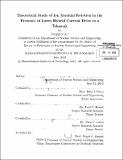Theoretical study of ion toroidal rotation in the presence of lower hybrid current drive in a tokamak
Author(s)
Lee, Jungpyo
DownloadFull printable version (11.76Mb)
Other Contributors
Massachusetts Institute of Technology. Department of Nuclear Science and Engineering.
Advisor
Felix I. Parra.
Terms of use
Metadata
Show full item recordAbstract
In this thesis, the effect of the lower hybrid current drive on ion toroidal rotation in a tokamak is investigated theoretically. Lower hybrid frequency waves are utilized to drive non-inductive current for steady state tokamaks and ion toroidal rotation is used to control disruptions and improve confinement. It has been observed in many tokamaks that lower hybrid waves can change the ion toroidal rotation. These measurements indicate that it may be possible to control rotation with lower hybrid waves, but to do it, it is necessary to understand the mechanisms underlying the rotation change. The toroidal angular momentum injected by the lower hybrid waves initiates acceleration in the the counter-current direction. The parallel and perpendicular components of the toroidal angular momentum are transferred from the waves to ions through electrons via two different channels, and the ions obtain the full toroidal angular momentum injected by the lower hybrid waves after several ion collision times. The momentum transferred to the ions is transported out by turbulent radial transport. The radial transport of toroidal angular momentum is evaluated using gyrokinetics corrected to the higher order in poloidal rhostar. The higher order corrections lead to momentum redistribution even in the absence of rotation, which is called intrinsic momentum transport. The intrinsic momentum transport due to diamagnetic effects is an important piece of the radial momentum transport. The change in the steady state rotation due to lower hybrid waves is estimated theoretically by evaluating the momentum source, the momentum pinch and diffusion, and the intrinsic momentum transport. The effect of the current profile on the intrinsic momentum transport, which is modified by the lower hybrid wave, may explain the reversal of the rotation change from counter-current direction to co-current direction observed in low plasma current discharges in Alcator C-Mod.
Description
Thesis (Ph. D.)--Massachusetts Institute of Technology, Department of Nuclear Science and Engineering, 2013. Cataloged from PDF version of thesis. Includes bibliographical references (pages 175-182).
Date issued
2013Department
Massachusetts Institute of Technology. Department of Nuclear Science and EngineeringPublisher
Massachusetts Institute of Technology
Keywords
Nuclear Science and Engineering.